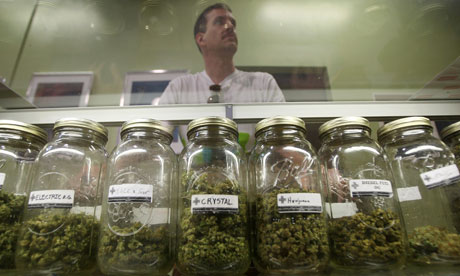America's self-defeating 'war on drugs'
Distressingly, the Obama White House seems determined to paint itself into a corner of prohibitionist law enforcement

- guardian.co.uk, Tuesday 8 November 2011 19.30 GMT
- Article history
 California permitted medical marijuana in 1996, but the Obama administration has declared its intent to crack down on the legal trade. Photograph: David McNew/Getty Images
California permitted medical marijuana in 1996, but the Obama administration has declared its intent to crack down on the legal trade. Photograph: David McNew/Getty ImagesThe murky doings of the hacker group Anonymous took a remarkable turn in recent days. A Mexican drug cartel allegedly kidnapped an Anonymous member, and then, after the loosely organised hackers said they would reveal names of cartel personnel, released him with threats to kill the hacker's family if the names were revealed.
The affair, which played out in blogs and on Twitter, coincided with a week I spent in central Mexico, where I led several workshops for new-media creators. In conversations with a number of people during my visit, I got a clearer understanding of the fear that pervades Mexican society – an undercurrent that also combined despair and anger at the way the cartels have corrupted the country's institutions.
More than almost any other place, Mexico holds dangers for anyone who dares to oppose the cartels, or even tell the truth about what they are doing. Journalists who do so are targets. So are bloggers. The deaths mount, and even honorable truth-tellers are understandably intimidated.
Several people I met in Mexico said they wished for better information about what is actually happening; trust for the press, with its understandable reluctance to cover the story, is low. How, they asked, could Mexicans create a safe online service that would provide the information the media are too afraid to publish themselves, as well as a place for the people to talk among themselves about what they could do to curb the violence? It would be immensely difficult, I said, but well worth the effort.
Back home in California last weekend, I read some depressing – and absolutely related – news. The Obama administration has gone on the attack against legal marijuana sales, breaking yet another promise (are there any unbroken ones left?) – in this case, a commitment to let states set their own policies in this arena. California law grants broad permission for medical use; getting a prescription is trivially simple, by design, and stores selling the plant have sprouted around the state. But the Obama people have declared their intent to invoke federal law against anyone who profits from state-legal marijuana – including even newspapers that carry advertisements for the stores.
What's sad, but predictable in the current political environment, is the way the Obama White House has felt obliged to ignore its previously semi-enlightened position on drugs, of seeing abuse much more as a medical than law-enforcement issue. Now, Obama is just another in the long line of presidents prosecuting the cynical and counterproductive "war on drugs".
Who profits from this insane war? The Mexican cartels, among many others.
A few weeks ago, I had the honor of meeting Mexico's former president, Vicente Fox, at a conference in Canada. In a talk there, he repeated what he's said many times before: Mexico's disaster has American roots. Demand in the United States is fuelling the cartels' market, and prohibition has not – nor has ever – worked. It's time, he said, to legalise or at least decriminalise drugs. He pointed to the example of Portugal, which legalised drugs a decade ago and is, by all evidence, better-off for having done so.
The anti-drug warriors are aghast at such heresy. But however well-meaning some may be, their thinking is at best muddled and often hypocritical. In particular, they refuse to ask the question that matters most: would society be better- or worse-off with legalised drugs, compared with conditions today?
Yes, we would probably have some new addicts, although Portugal's usage rate is among Europe's lowest; and we would bear the costs of their addiction. But compare that to what we pay, in money and lives, as a result of drugs being illegal: thoroughly corrupt legal systems; massive violence as sellers compete with honest police and each other; the wholesale dismemberment of civil liberties; vast and expanding prison systems; and so much more.
Our addiction to criminalisation is also crazy in a fiscal sense. The government revenue potential from taxing legal drugs is staggering, and given governments' current poverty, it is astonishing that they ignore it.
Any remotely honest assessment would conclude that any new problems caused by legal drugs are dwarfed by the known catastrophe of prohibition. Even if the costs were closer to parity (again, never mind the revenue possibilities), what about the damage to our fundamental liberties caused by the prohibition regime? We learned these lessons decades ago from the catastrophic ban on alcohol – a drug that takes an enormous but manageable toll on society – but refuse to learn them now.
And where are US journalists? With few exceptions, they don't even ask these questions, much less seriously investigate the toll taken by prohibition. To their shame, they parrot government hyperbole and lies.
The Mexican cartels would not disappear quietly if America did the sane thing and legalised drugs. But a major source of their income and power would fade over time, as President Fox says.
If I can, I will help the people I met in Mexico create a safe online venue for the reality of what is happening there. But I would rather see my own country end its corrupt and self-destructive policy of prohibition.
Mexican journalists avoid the truth because their lives are at risk. America's journalists have no such excuse.
2011-11-10
America's self-defeating 'war on drugs' | Dan Gillmor | Comment is free | guardian.co.uk
via guardian.co.uk